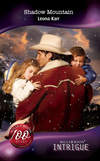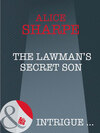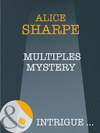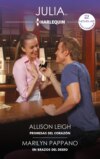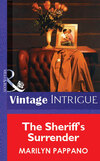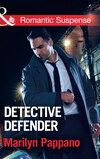Kitabı oku: «More Than a Hero», sayfa 3
Kylie Riordan, living a very dull life.
It was for the best. He was a very determined man, and so was her father. Between them was no place to be stuck.
“Missy?”
She refocused on Judge Markham. When she was little, he’d called her Miss Kylie and treated her like a princess. Somewhere along the way he’d dropped the Kylie and switched to Missy, and what had begun as affection had come to feel like condescension. She used the annoyance it stirred to shield her from the guilt as she prepared to lie. “I’m sorry, Judge. The senator called this morning and mentioned the transcript. His message was, naturally, a little vague.”
Judge Markham nodded as if the senator being vague in a private phone call with his daughter made perfect sense.
“He mentioned you and the transcript. I thought he wanted me to take it for safekeeping.”
“What time this morning?”
“Shortly after I arrived at the office.”
He nodded as if that meant something. “Well, he called me this afternoon and told me to destroy it, and that’s what I did. Clearly he recognized the wisdom of my method of safekeeping.” Rising from his chair, he patted her shoulder on his way to the door. He didn’t seem to notice that, despite his clear invitation to leave, she was frozen in her seat.
Destroying court records—that was a felony. Her father couldn’t possibly have suggested…Judge Markham surely must have misunderstood…the senator never would have condoned…
Acid bubbled in her stomach, and her limbs were rigidly locked in place. When her brain finally gave the command to rise, she had to push to her feet, forcibly straightening her knees, mechanically lifting one foot, then the other, to walk across the judge’s library and into the marbled foyer.
“You forgot your bag, Missy.”
It took a moment for the words to clear the buzzing in her ears, for her mind to make sense of them. “My…bag?”
The judge disappeared into the library, then returned holding her purse at arm’s length as if carrying it properly might bring his manhood into question. He offered it to her, then, when she made no effort to take it, impatiently slid the strap over her limp arm to her shoulder. “Are you okay?”
She gave herself a mental shake. “Y-yes. Just a…a headache.”
“Nothing a shot of good whiskey wouldn’t cure, I bet.” In his world, there was nothing a shot of good whiskey couldn’t cure.
She smiled, hoping it looked halfway genuine. “I believe I’ll settle for aspirin. I’m sorry to have disturbed you, Judge.” She opened the door, gazed out at her car parked in the circular drive out front, then turned back. “I would appreciate it, sir, if you didn’t tell the senator about this. I would hate for him to think that I misunderstood his instructions.”
“Tell him about what?” Judge Markham grinned and winked as he lifted his own glass of whiskey in a salute. “Don’t you worry, Missy. It’s our secret.”
Our secret. She’d never kept secrets from her father, and wasn’t sure why she’d decided to start now. Because if he knew she knew the transcript had been destroyed, he might confess that he’d given the order?
No. She didn’t believe that—couldn’t believe it. Her father had devoted his entire life to public service. He was an honest, upright, moral person. He hadn’t told Judge Markham to destroy those records. He would be horrified when he found out what the judge had done.
But Judge Markham had devoted his entire life to public service, as well, a small voice that sounded a lot like Jake Norris whispered slyly. He was also an honest, upright, moral person…who hadn’t hesitated a moment before breaking the law.
You know nothing of the facts, she’d told Norris the evening before. She was beginning to fear that she was the one who needed an education.
She stopped at the street. If she turned right, she could be home in a matter of seconds…to do what? Fret? If she turned left, she could return to the office, where she could at least fret in an environment more conducive to work.
She chose left, driving the short distance downtown. She parked near the office but didn’t go inside. Instead, impulsively, she crossed the square to the redbrick building on the far side that housed the Joshua Colby Memorial Library. After climbing the broad granite steps, she went through the double doors and headed to the reference section.
The Riverview Journal had been online for five years. Any article from that time could be found in their online archives, along with anything from their first twenty years in business. The rest was being added slowly but was accessible in the meantime on microfilm.
Usually.
The microfilm inside the box labeled September from the year of the trial was blank. So were the films for August and October. Kylie took the boxes to the desk. After exchanging pleasantries with the librarian, she said, “There’s a problem with these films, Mary Anne. They’re blank.”
Mary Anne’s gaze flickered to the worn storage boxes before returning to the books she was sorting. “Really? Isn’t that odd?”
“Have they always been blank?”
“I wouldn’t know, Kylie.”
“Has anyone else looked at them lately?”
“I can’t say. They’re on the shelves. Anyone can use them. We don’t keep track.”
Kylie wanted to grab her, to make her stop what she was doing and look at her, but kept her hands at her sides. “Do you have a copy?”
“No. Afraid not. Sorry.” With an apologetic smile aimed in Kylie’s general direction the woman walked away from the counter, taking refuge in the small office behind her.
Puzzled, Kylie left the library. She’d known Mary Anne since first grade and she’d never seen her act quite so cavalierly. Mary Anne was generally as protective of her library materials as Martha was of her court records. Neither woman’s behavior that day had been typical. Nor had Judge Markham’s or the Senator’s.
And the one common denominator was the Baker case.
Grimly Kylie walked the block and a half to the Journal’s office. Does it bother you, Norris had asked, that everyone says this is an open-and-shut case, and yet no one wants to talk about it?
More and more every minute.
The newspaper office was small and dusty, but the staff put out a good paper given their resources. Words were usually spelled correctly, sentences usually punctuated properly. Dale Bayouth, the owner, publisher and Web master, was sitting at his desk, tinkering with the Web site, when she walked in. He greeted her with an easy smile. “Kylie. What can I do for you?”
She explained about the microfilm at the library, then asked, “Can I see your copies from that time period?”
He began shaking his head before she finished. “Sorry. They’re not available. I sent everything to my son down in Houston. He’s working on the website archives.”
How convenient. Frustration made her teeth grind, but she forced a smile. “It was worth a try. Thanks anyway.”
She left before she could find the courage to ask when he had sent the archives to his son and at whose suggestion. She doubted he would tell her, and if he would, she wasn’t sure she really wanted to know.
The answer might be more than she could bear.
Chapter 3
After striking out at the courthouse, the library and the newspaper—and with Kylie—Jake wasn’t in the best of moods. The only thing he could think of doing at the moment was the one he really didn’t want to do: visiting the scene of the crime.
The Bakers and the Franklins had lived three miles outside Riverview, at the end of a dirt road that forked to lead to each house. They’d been fairly close neighbors for the country, with no more than a third of a mile between their houses, but in every other way they’d been miles apart.
Bert Franklin had been president of the First National Bank of Riverview. Charley Baker had worked at the glass plant north of town. The Franklin home had looked like something out of Gone with the Wind, with columns and verandas and a vast expanse of lush green lawn, while the Bakers’ rental had been small, dark and one good wind away from collapse. Jillian Franklin had spent her days lunching, shopping and planning events, and Angela Baker had waited tables at the truck stop outside town. The Franklins had been among the town’s social elite. Riverview hadn’t known the Bakers existed.
In the end, though, the Bakers and the Franklins had shared one thing in common: their lives had been destroyed that September night.
Wishing for any excuse not to go, Jake headed west out of town. With each tenth of a mile the odometer ticked off his fingers tightened around the steering wheel. When the sign for Woodlawn Memorial Gardens appeared ahead, he grabbed at the chance to delay the trip out of town at least a little longer.
He drove through a stone arch, then turned onto the first narrow road. There was an office to the right, but it was locked up tight. In an alcove near the door, though, he found a grave locator. He looked up the Franklins, then returned to the truck and drove slowly along the lane. Section six was at the far end of the second row of plots. It was also where the only other vehicle on the grounds was parked. A slender figure, a young woman, knelt in front of a double marker, tending the flowers planted there.
He considered driving on and returning after she was gone, but then she looked straight at him and smiled—really smiled. No one had directed a smile like that at him since he’d arrived in town.
She got to her feet and lifted one hand to stop him. He braked, then rolled down his window as she took a few steps toward him.
“You’re Jake Norris,” she said. “I was hoping to meet you. I’m—”
The angel. Silky brown curls, huge blue eyes, Cupid’s bow mouth. “Therese Franklin.” All those years ago, he’d thought she was of no consequence—too young, too girlie, too spoiled. He would have been much happier if the Franklins had had a son or even a dog.
Except that one morning when he’d found her sitting next to her dead mother. When he’d grabbed her up, held her tightly and run from the house with her, yelling for his father at the top of his lungs.
She looked pleased that he’d recognized her. According to Kylie, she’d pleaded with the senator to stop Jake from researching this case. Kylie’s lie? Or Riordan’s?
He preferred to think Riordan’s.
He parked in front of her car, then got out and joined her in the drab green grass. She was of average height and so slender that a stiff breeze could blow her away—quite possibly the most delicate creature he’d ever seen. Even her voice, light and airy, sounded as if it belonged in another world.
“I assumed I would be getting a visit from you sooner or later,” she remarked in that ethereal voice as they walked back to her parents’ graves. On the other side, another double marker bore her grandparents’ names, along with the dates of their births and his death.
Jake thought it ghoulish to have your name on a grave marker while you were still alive.
“Actually, I hadn’t decided whether I would try to interview you,” he admitted. “You were very young at the time, and I’d been warned this is a bad time for you.”
Her gaze shifted to her grandfather’s grave, and sadness dimmed her eyes. But when she looked back at him, she was smiling again, albeit faintly. “I doubt I’d be able to contribute much, if anything. But there’s a lot I’d like to know. My grandparents didn’t talk about my parents. It was too painful for them. I thought they had died in an accident until I was in high school, when I found out they’d been murdered.”
“That must have been tough.”
She shrugged.
“So you don’t object to my writing a book about this.”
Bending, she tugged a stubborn weed from the base of the monument, then straightened again. “Truthfully…you’re right. I was very young. I don’t remember my parents. I don’t feel a connection to them. They’re symbols rather than people to me. Maybe through your book I can get to know them.”
Abruptly she smiled and looked more like fifteen than twenty-five. “I’m reading your last book. I feel I know those people. That’s what I’m hoping for with this one.”
“What if you don’t like what you see?” It was always a possibility. She could find out that her mother or father had done something to cause their murders…just as he could find out that his father really had committed the murders. “They say ignorance is bliss.”
She smiled again. “Whoever says that isn’t the one being kept in the dark. I don’t think it’s too much to ask that I know about the people who brought me into this world, good or bad.”
“So you’re willing to sit down and talk with me?”
She brushed a strand of fine hair from her face. “I’d like that. My number’s—”
The squeal of tires on the highway interrupted her, and they both looked in that direction. A white police car was angled across both lanes as the driver made a clumsy U-turn.
“Derek,” Jake and Therese both said at the same time. She went on. “You know him?”
“He’s been following me, probably on the chief’s orders. I didn’t realize I’d lost him for this long.”
“He’s my boyfriend,” she said with a shy shrug. “Maybe you should leave. My number’s in the phone book. Call me?”
“I will.” Jake returned to his truck as Derek sped through the gate, then skidded into the first turn. The kid was probably enough of a hothead to confront him, unless Therese persuaded him not to.
Apparently she did. A glance back that way as Jake approached the gate showed the police car stopped in the middle of the road and Therese standing beside it, gesturing as she talked.
Jake turned west again on 66. A half mile from the cemetery, he turned north onto another paved road, followed it for a time, then reached the dirt road. He turned and stopped.
Neither house was visible from there. The road climbed straight up a hill with heavy woods on either side. At the Y, a road to the left led to the Baker house, a road to the right to the Franklins’.
Were the houses still standing? Had anyone ever lived in them again?
He would find out…but not today.
Backing onto the road, he headed back to town.
This case was becoming more difficult every time he turned around. No trial transcript, no newspaper articles, no cooperation from any of the principals besides Charley and, now, Therese, who frankly wouldn’t be much help. If her grandparents had refused to talk about her parents, then it was doubtful they’d saved anything that had to do with their deaths or the trial.
But after leaving the newspaper office empty-handed, he’d gone back to the courthouse and copied the case file before it could disappear, as well. It contained information on the warrants, a summary of each court appearance and other such data, including the name of the court reporter. He intended to track her down and see if, by chance, she still had the original of the transcript. He could find out who’d written the newspaper stories for the Journal and whether he’d kept copies. He could try to locate people who’d known Charley or the Franklins. And he could keep agitating Riordan and his cronies.
Agitated people tended to make mistakes.
It was five-thirty when he circled the courthouse. The parking spaces on the block where Riordan’s office was located were all empty but one. It held a silver Jaguar with the license tag designated for state senators. Since it had been parked there most of the day, he figured Kylie was driving Daddy’s car. He eased into the space next to it, pulled out his cell phone and punched in the office number.
He saw movement through the partially open blinds at the window in front of him an instant before she answered. “Riordan Law Office. This is Kylie.”
Shifting his gaze to the door, he saw the same name lettered in gold there. “And here I thought being a part-time senator was your father’s only job. Does he actually have any law clients?”
She was silent a moment before replying, “A few. People who have been with him from the beginning.”
“Judge Markham, Chief Roberts, Tim Jenkins…”
Somehow her silence took on an offended quality.
He rubbed his temple with one hand. “Sorry. Do you know that someone went into the library, took the microfilm containing all the newspaper stories about the Franklins’ murders and Charley’s trial and replaced it with blank film?”
“As a matter of fact, I do.”
“And that the newspaper owner just happened to send all his archives to his son in Houston just a few days ago?”
“I didn’t know when.”
“Does it bother you—”
“Yes,” she interrupted. “I admit it. Something’s wrong here. Someone’s trying to stonewall you, to dissuade you.” She gave the word dissuade a twist, as if it disgusted her. “I just can’t figure out why.”
“Because they’ve got something to hide,” he said quietly. “Because they’re covering up something that happened twenty-two years ago.”
He waited for her to argue with him, but she didn’t. She merely sighed.
“Did you go see Judge Markham?”
“Where are you?” she asked.
“Sitting next to Senator Riordan’s Jag.”
Again he saw movement inside, then the blinds moved about eye level. He could vaguely make out her silhouette, but all the enticing details—the curves, the colors, the scent, the goddessness—were hidden. It didn’t matter. He had enough details about her stored in his memory to entice him for a good long while.
The blinds moved again, then became still. “I’ll be out in a minute.”
It was closer to ten minutes when she finally stepped through the door, locked up, then started his way. She wore the same green dress, the same sexy heels and the same diamond studs, though there was no direct sunlight to make them twinkle. The only difference from that morning was her hair—pulled back in a sleek braid—and her expression. She looked weary. Disappointed.
He hoped he wasn’t the cause, though of course he had something to do with it.
She walked to the driver’s side and waited motionlessly as he rolled the window down. Even then, she didn’t say anything.
Finally he did. “Want to have a drink before dinner?”
“How about a few drinks instead of dinner?” she wryly suggested. Without waiting for an invitation, she walked to the other side of the truck and climbed in—and managed to do so without showing more than an inch or two of thigh, he was disappointed to notice.
He had to move his backpack to make room for her and her attaché. “My research,” he remarked as he hefted it into the narrow space behind the seat. “The way things are disappearing around here, I’m afraid to let it out of my sight.”
She didn’t respond.
He didn’t ask where she wanted to go but backed out of the space. When he reached Main Street, he turned east and drove past his motel, past the businesses that gave way to houses that gave way to countryside. There were plenty of restaurants with bars in Tulsa, if they didn’t find someplace sooner, though he couldn’t imagine the daughter of Senator Jim Riordan letting loose and tying one on. She was too image-conscious for that.
The sun was low on the western horizon when she finally spoke. “He destroyed it.”
“Who destroyed what?”
“Judge Markham. The trial transcript. He destroyed it.”
“He told you that?”
“No, I read it in his palm,” she snapped. “Of course he told me.”
“Why would he tell you? Destroying court records is a crime.”
She opened her mouth, then closed it tightly and stared out the side window.
Jake’s muscles tightened, then eased. He wasn’t too surprised by the destruction. The admission, though…obviously Markham trusted Kylie enough to confide his own lawbreaking to her. He didn’t expect her to do anything with the information, to turn him in or make a complaint.
And if Markham could trust her that much…Jake shouldn’t trust her at all.
“Are you always this unpopular when you’re researching a book?” she asked after a time.
He managed a grin. “No. Riverview is setting a new low in my career.”
“But people aren’t always happy when they hear what you plan to do.”
“Not always. But this is the first time people have hidden or destroyed records. It’s the first time a cop has dogged my every step.” He saw her gaze flit to the outside mirror, checking the road behind them. He grinned again. “He turned around at the city limits. He probably recognized you and figured you’d fill in Chief Roberts.”
“I avoid speaking to Chief Roberts when I can.”
“You don’t like him?”
She lifted one shoulder in a shrug. “He’s a friend of my father’s. Not mine.” Shifting in the seat, she faced him. “The senator says your books are inaccurate, that you twist the facts and sensationalize the acts to maximize sales.”
A muscle twitched in Jake’s cheek, the annoying kind of jerk that he could damn near see. “He’s wrong,” he said stiffly. His work was important to him. It was all he really had besides his mother, whose past went back only so far as her current marriage, and his father, wasting away in prison. He was proud of every aspect of every book that had his name on the cover. “The senator also said—”
“Turn left up ahead,” she directed, gesturing to where a flashing red light marked a four-way stop sign.
He obeyed, then followed her next direction into the parking lot that fronted a middle-of-nowhere bar. The smell of grease hung heavy on the air, suggesting the place also served food. He looked from the cinder-block building to the elegant woman unbuckling her seat belt. “Not quite your kind of place.”
“Good hamburgers, good fries, good music—and no one gives a damn about the senator or his daughter.” Leaving her attaché, she slid to the ground and slammed the door.
He grabbed his backpack and followed her inside, admiring the way the green dress clung to her hips and molded to her backside. She moved as if she’d gone through years of dance or gymnastics. Probably both had been deemed essential for the senator’s sake. After all, what would people think if his daughter was a less-than-perfect klutz?
The bar was dimly lit, as all bars should be, with pool tables on the left, a jukebox to the right, a small dance floor in the middle and tables and booths all around. It was too early in the evening for much of a crowd, though a half dozen young men were gathered around the pool tables and twice that number occupied a few tables.
Kylie chose the corner booth, as far from the door as they could get, and sat with her back to the room. He didn’t mind. He’d rather face trouble than let it sneak up behind him.
When the waitress came, she ordered a burger, fries and a Coke. He asked for the same, except with beer, then settled comfortably on the bench to watch her. She didn’t seem to mind.
“The senator also said what?”
He didn’t understand her question without thinking back. He’d been about to tell her about Therese when she’d interrupted to give him directions. Now he half wished he hadn’t said anything. She wasn’t going to like it and she looked as if she’d had enough disappointments—disillusionments?—for one day. But she was waiting and she was going to find out anyway. “He told you that Therese Franklin didn’t want me looking into her parents’ murders. That she pleaded with him to stop me.”
Kylie nodded once. Even in the near darkness her hair trapped light from somewhere, giving it a golden gleam.
“I ran into Therese today. She was enthusiastic about the book. She wants to talk to me, wants me to call her.”
For a long moment Kylie simply stared at him, looking…unsettled was the best word he could come up with. There was a little surprise, a lot of dismay and a lot of…well, unsettledness. “You’re saying the senator lied to me.”
Yes. “I’m saying Therese doesn’t appear to have any interest in stopping this book. That seems to be the senator’s agenda. And the judge’s. And the chief’s.”
Abruptly she covered her face with both hands, pressing her fingertips hard against her temples. He couldn’t blame her if she had a headache. Learning ugly things about the person you’ve given unconditional loyalty to could be enough to make anyone sick.
“Hey.” Leaning across the table, he caught hold of her left hand and pulled it away. “Let’s forget about this for a while, okay? Let’s just enjoy our dinner and each other’s company and deal with the rest of it later. Okay?”
Kylie kept her eyes closed a moment, focusing her attention on his hand. His palm was callused, his fingers strong, his touch gentle and warm. Just that little contact, and her breathing was easing, her tension lessening. If he really touched her—pulled her close, slid his arms around her, stroked her body—she just might melt…or shatter.
Finally she opened her eyes, carefully withdrew her hand from his and called up a practiced smile. “How did you get into the newspaper business?”
His grin was crooked and charming. “You did check me out.”
She’d been checking him out since the moment she’d first seen him.
“My mother married a man who owned three small-town papers, along with a ranch. I had a choice between castrating cattle and shoveling manure or working at the paper. Like many males, I get a little squeamish about castration, so I opted for the paper.”
“Where you still had to deal with plenty of manure.”
He nodded.
“Why did you start writing this kind of book? Why not fiction?”
The waitress approached before he could answer. After she left their food, he salted his fries, squirted ketchup onto his plate, then took a bite of his hamburger before facing her again. “Someone I was very close to was the victim of a crime. Writing about other victims seemed a reasonable way to deal with it.”
He was choosing his words carefully. Because losing that person still hurt? Because he didn’t like discussing his grief? And yet he expected other people to discuss theirs.
Not fair, Kylie admitted, at least in this case. The people who’d grieved in this case were Therese Franklin, Charley Baker and his family. They were willing to talk with Jake. It was the ones who’d made their careers off the case who wanted it kept buried.
It was her father.
Swallowing hard, she pushed all thought of the senator to the back of her mind. “Are you married?”
Jake looked offended. “Would I have said what I did today if I was married?”
You know I’m attracted to you. Desire feathered through her belly. Pure lust. She hadn’t felt it in such a long time.
“Some men don’t take their wedding vows seriously. I don’t know you well enough to say.” Just enough to know that she wanted to fall into bed with him. She probably wouldn’t, but the wanting was there.
“I’m not married—have never come close. I do date, but there’s no one serious and hasn’t been for a long time. I’m thirty-two. I live in Albuquerque, though one of these days I plan to move out of the city and up into the mountains. I went to college for a couple years but quit when I realized it wasn’t going to help me do what I wanted to do—write. This is my sixth book, and I’m under contract for one more. I’ve considered writing fiction and will probably give it a shot before too long—mysteries, probably, or thrillers. And I would never come on to one woman while I was involved with another.” He took a breath, then fixed his dark gaze on her. “Your turn.”
She delayed by taking a bite of her hamburger, then following it with a couple of fries. Finally she shrugged. “I’m not married either, though I did come close. He would have made a great son-in-law for the senator but not such a great husband for me. I’m twenty-seven, I live in Riverview and Oklahoma City and I don’t plan to move anywhere. I began working for my father when I was fifteen, and after I graduated from Oklahoma State I continued to work for him. The pay is good, the hours are flexible and I like my boss. For a time I wanted to go into politics myself, but not anymore. I was raised to be a good politician’s daughter and, someday, a good politician’s wife. So far, I’ve succeeded at one and have no interest in the other. And I would never get involved with a man who was with another woman.”
“So will you get involved with me?”
His whiskey-smooth voice made the word sound intimate and naughty and conjured up all sorts of images in her mind. Naked, hot, needy, wicked. Her clothing suddenly seemed too tight, too warm. She couldn’t breathe. Couldn’t think. Couldn’t…couldn’t.
“You know you’re attracted to me,” he pointed out.
Her hand trembled as she reached for her glass, then took a cooling drink. “I do?”
His grin this time was pure charm—no brashness, no arrogance. “You know how you’re looking at me…it’s the same way I look at you. There’s something between us. Something…”
That sizzled. She knew it. She felt it. Still, she didn’t admit it. “We’re on opposite sides of this book.”
“I don’t think so. I want the truth. Isn’t that what you want?”
Pulling her gaze from him so she could think clearly, she considered it. She did want the truth…didn’t she? Or did she simply want it to go away so she could continue to believe—naively, perhaps—that her father would do no wrong? Did she want the truth or the pre-Jake Norris status quo?
“You think my father committed a crime,” she said, her gaze fixed on a spot above Jake’s head. If Judge Markham had been truthful, at the very least the senator had conspired with him in destroying court records.
“I thought we weren’t going to talk about this.”
She let her gaze slide down to his face. “I can’t compartmentalize my life. Everything affects everything else. I can’t just forget that you’re investigating my father and go off and have wild sex with you.”
“But you’d like to.”
If not for his crooked and oh-so-confident smile, she couldn’t have answered. As it was, she merely shrugged, then repeated her comment. “You think my father committed a crime.”
Ücretsiz ön izlemeyi tamamladınız.

